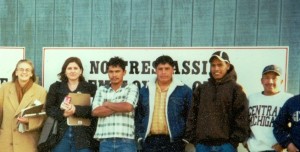By Lori Johnson, an attorney with the Farmworker Unit of Legal Aid of North Carolina
As a farmworker attorney in North Carolina, simply meeting with my clients poses an ongoing challenge. This reality became clear to me several years ago while meeting with a client outside his home. A squad car pulled into the yard, and fear washed over my client’s face. My client’s employer sought trespass charges against me, even though my client, the actual resident, had invited me. My client had no telephone or means of transportation, so meeting him after work hours where he lived was necessary.
The deputies let me argue my case to a magistrate over the squad car telephone, and she deferred my arrest pending an opinion from the North Carolina Attorney General on whether trespass charges would stand against an attorney present at a labor camp at the invitation of the occupant farmworker. While the resulting opinion was favorable, threatened and actual police force continue to be used against migrant service providers in North Carolina and throughout the nation.
Can there be justice for farmworkers when employers use police force to prevent employees from meeting with counsel? What happens to client confidentiality when the adverse party threatens criminal sanctions against counsel unless given prior notice of attorney-client meetings?
Spearheaded by Maryland Legal Aid and the Transnational Legal Clinic at the University of Pennsylvania Law School, a nationwide coalition of farmworker advocates now seek a hearing before the Inter-American Commission on Human Rights (IACHR) to address these concerns of access to counsel and other rights. The IACHR promotes and defends human rights for member nations of the Organization of American States (OAS).
The request asks the IACHR to hold a hearing on whether the United States has violated the American Declaration on the Rights and Duties of Man and other human rights instruments by failing to ensure that human rights defenders have access to migrant farmworker labor camps. The coalition’s request for a hearing follows prior actions, including a 2012 human rights complaint filed before the United Nations.
Farmworkers typically reside in employer-owned labor camps in remote locations. Since farmworkers, with no personal means of transport, are unable to travel to the non-profit legal service providers, these service providers must instead go to the labor camps during the workers’ free time. Growers, seeking to control their workers, routinely assert that they, and not the actual residents, determine who may enter worker housing. Criminal trespass charges and occasional physical force are used against service providers as a means to isolate farmworkers.
The lack of an effective legal framework securing service provider access to labor camps violates freedom of assembly and association, freedom from arbitrary arrest, and the right to personal security. For farmworkers, being unable to effectively meet with counsel renders due process meaningless. Yet even where state attorney general opinions or case law support a farmworker’s right to have visitors – generally based on tenancy rights or freedom of association- law enforcement officials are often unaware of such protections or refuse to acknowledge said rights.
In Fall of 2013, my co-workers made a two hour drive to visit an injured farmworker. The meeting was disrupted when his employers burst into the client’s home and threatened my co-workers with arrest for criminal trespass. The deputy who arrived later declined to make arrests, but the situation made it impossible to continue our client’s interview. In his 911 call, the employer claimed that the injured worker should not have called Legal Aid because, in the employer’s opinion, the worker was already receiving his workers’ compensation benefits.
Employers have used criminal sanctions in attempts to coerce confidential information. A New Jersey legal aid lawyer was recently charged with criminal trespass despite favorable state case law. The municipal prosecutor offered to drop the charges if the attorney agreed to give the employer prior notice before meeting with workers, which the attorney, given confidentiality duties, rightfully refused. Charges were only dismissed when the employer did not show at trial. Employers have also demanded disclosure of the worker’s identity in order “to verify” the invitation with the worker. One can imagine how that conversation would play out.
Access to counsel is especially important because farmworkers face greater rates of unlawful and dangerous working conditions. A 2011 North Carolina study found that farmworkers commonly suffer wage theft and pesticide safety violations. Agriculture is one of the most hazardous occupations, with some of the highest rates of fatal and non-fatal injuries. Farmworkers are also subject to “agricultural exceptionalism”, i.e., the exempting of farmworkers from rights enjoyed by others, such as basic workplace safety requirements, collective bargaining protections or workers’ compensation.
Employers with the most to hide use force to isolate and control workers. The farm that sought to have me arrested, for example, had a deeply disturbing history. A worker’s brutal death had led to involuntary servitude convictions against its crew managers. Human traffickers tightly control who may enter labor camps as a means to further their trafficking scheme by preventing escape.
While law enforcement should be seen as an ally of farmworkers against human traffickers, the sight of police preventing workers from meeting with counsel sends instead the chilling message that there is no justice in our courts. The coalition demands that the United States be held accountable in ensuring justice for all. The United States has yet to respond to the United Nations Special Rapporteur’s request for a response on this issue. The coalition now moves for a hearing before the IACHR.


![Private property with dog[1]](https://staging.lawatthemargins.com/wp-content/uploads/2014/01/Private-property-with-dog1-300x211.jpg)




